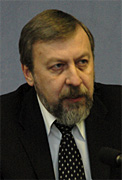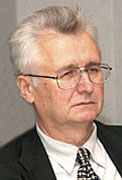Andrei Sannikov: "Belarusian dictator builds Potemkin Villages for the West"
17- 2.03.2009, 16:50
Is the cooperation with the dictatorship of Lukashenka collaboration?
That was the topic of the discussion at the Russian service of Radio Liberty with participation of the leader of the civil campaign “European Belarus”, former deputy Foreign Minister of Belarus Andrei Sannikov and the former head of the National Bank of Belarus, Honourable chairman of the United Civil Party Stanislau Bahdankevich.
As the Radio Liberty reminds, in the end of February the High Representative of the Common Foreign and Security Policy (CFSP) of the EU Javier Solana visited Minsk. It was a result of establishing ties between the European organisations and Belarusian authorities. However part of the Belarusian opposition is highly critical about the actions of the EU, believing that out of political expediency European officials are in fact giving a cart blanche to Alyaksandr Lukashenka for maintaining the undemocratic regime.
A few representatives of different oppositional forces have agreed to join the public advisory council set up about a year ago by Lukashenka’s administration. The oppositionists who are speaking out against any contacts with the regime have already libel the cooperation as collaboration.
 The former deputy Foreign Minister of Belarus, and currently a coordinator of the civil campaign “European Belarus” Andrei Sannikov believes that by forming the public advisory council Lukashenka is building a kind of a “Potemkin village” for the West, desiring to be given loans and other types of assistance. But the Belarusian dictator does not plan to reform the political system of the country. The oppositionists who have become members of the council help Lukashenka to reinforce the regime without its modernization.
The former deputy Foreign Minister of Belarus, and currently a coordinator of the civil campaign “European Belarus” Andrei Sannikov believes that by forming the public advisory council Lukashenka is building a kind of a “Potemkin village” for the West, desiring to be given loans and other types of assistance. But the Belarusian dictator does not plan to reform the political system of the country. The oppositionists who have become members of the council help Lukashenka to reinforce the regime without its modernization.
“The announced liberalization is nothing but a game with Europe and the West in general, attempts to receive credits, legitimization of Lukashenka’s regime. And it is happening in the context of non-stop repressions, non-stop crackdown on the civil society, on opposition in general; and in the context of constant flirting and deeper integration into the Russian scenario, including the military one. I believe that at the moment such games shouldn’t be played, as it helps the regime, but does not improve the situation in Belarus,” the leader of the “European Belarus” said.
 The former chairman of the National bank Stanislau Bahdankevich, one of those representatives of the opposition who had agreed to join the council formed by Lukashenka’s administration.
The former chairman of the National bank Stanislau Bahdankevich, one of those representatives of the opposition who had agreed to join the council formed by Lukashenka’s administration.
“We have always been committed to the position of such a dialogue in any form. That is why it is not a position of today. We need free communication. Undoubtedly, that demands freedom of mass media, but we do not have them, and we are in the trenches for 15 years, we are thrown away in a marginal gutter. That is why any possibility of a dialogue is beneficial for the democracy, for changing the attitude of the public towards the opposition, showing that there are experts, professionals in any sphere among them, and there are people who have done something for the country,” Bahdankevich believes.
Establishing relations is a policy of bluff, Andrei Sannikov says, as the regime has already stated its disinclination to consider the opinion of those representatives of the opposition who are to take part in the sessions of the Council.
“The councils have been created, but they are not a platform for a dialogue, or not even a place for some discussions, they are under total control of Lukashenka’s administration, they are created under leadership of officials of the administration. In his statements Lukashenka openly says that he won’t tolerate any middleman, and he won’t accept any “dirty” ideas of the opposition. So there is no desire to move in any direction even in words. I believe that a home dialogue could have helped to proceed or to solve problems, primarily of overcoming the crisis; and overcoming the crisis is simply impossible without changing the political situation,” the politician is convinced.
Stanislau Bahdankevich believes that the strategy of total denial of a possibility of a dialogue with the regime is one of the factors which have led the opposition to the hardest crisis. The nation has forgotten about its existence completely.
“For 15 years we have been members of no structures on a dialogue, though we have been seeking that. Well, have we achieved anything in our society? We have lost even the authority we had before, that we had in 1995-2000. We are only losing because of not being visible anywhere except our own environment. I think that it is absolutely unreasonable attitude. It proceeds from the presumption that people in the West are short-sighted silly people who take it in the wrong spirit when they see that a dialogue with the regime is carried out at some level. Only about 10% of the oppositional forces upheld this position,” the former head of the National Bank says.
Constructive work is impossible within the Council, Stanislau Bahdankevich is convinced, but now the opposition has a chance to remind about themselves and their ideas to the society.
“I expect that our society will see all these structures, councils, that there are sensible people inside the opposition, that they have ideas and proposals. It means that the platform for putting across our programs and ideas to the society is to become wider. It is not much, but nevertheless it is more than we had over these 15 years of dictatorship. I do not have illusions that these are negotiations with the regime. These are not negotiations, it is just a participation in a dialogue, it is a community of experts who are to discuss some problems, just discuss them. At least we shall say our opinion personally to the head of the administration, to the person who is close to our dictator. Is it bad?” Bahdankevich asks.
Andrei Sannikov disagrees that there is a crisis of the opposition. Its debt is opposition rallies and faithfulness to its principles.
“We are living in a totalitarian society. We cannot articulate our ideas when we have no access to mass media, and when effective electronic mass media do not exist, when no alternative views exist either on FM radio stations or TV. Newspapers which have been allowed to be sold in kiosks are just two newspapers, their distribution is limited, and their influence is minimal. That is why there is no possibility to reach people. But the possibilities we have, and for which we are beaten, are used by us. They include pickets, demonstrations of protest, especially related to the new political prisoners in Belarus. It is to continue, and I think that European officials should pay attention on that. When oppositionists rally in the streets with a demand to release political prisoners, defend their rights, it cannot be ignored, otherwise the regime is simply let off the leash,” the leader of the “European Belarus” is convinced.










